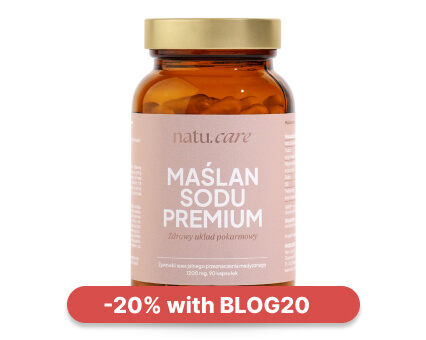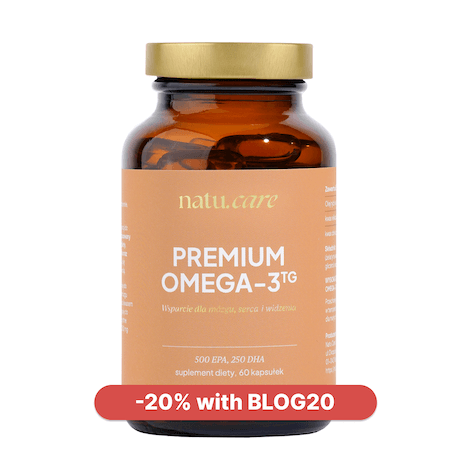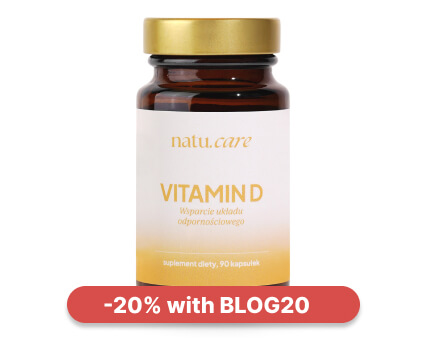Butyric acid: what it is, properties, use, harmfulness
Everything you need to know about butyric acid. See if it helps with intestinal disorders.


Learn more about our editorial process
.

Learn more about our editorial process
.

Learn more about our editorial process
.

Learn more about our editorial process
.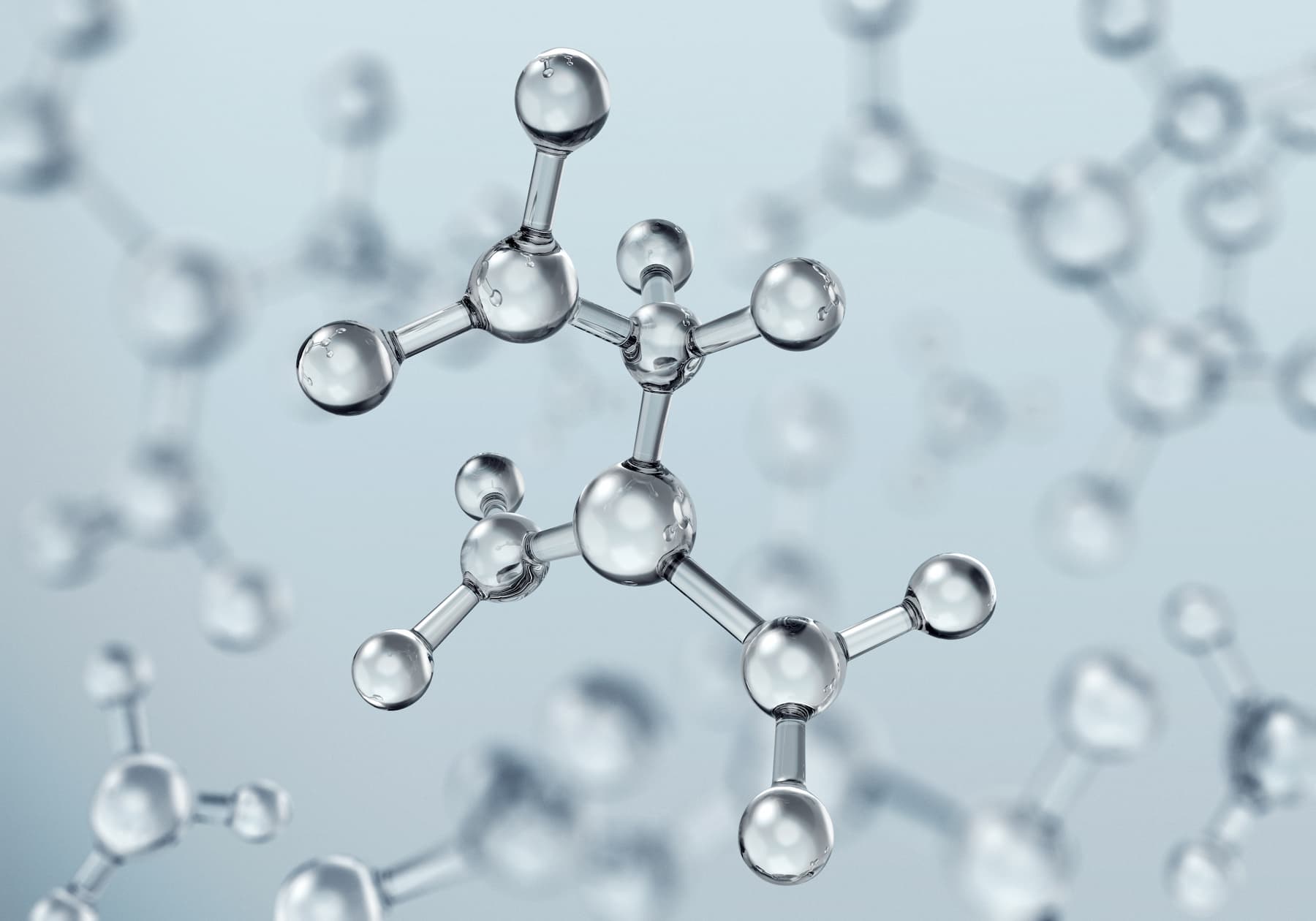
Why you can trust us
Articles on Natu.Care are written based on scientific research, data from government websites and other reliable sources. The texts are written in cooperation with doctors, nutritionists and other health and beauty experts. Articles are reviewed before publication and during significant updates.
.Learn more about our editorial process
.Information about advertisements
Content on Natu.Care may contain links to products from the sale of which we may receive a commission. When creating content, we adhere to high editorial standards and take care to be objective about the products discussed. The presence of affiliate links is not dictated by our partners, and we select the products we review ourselves completely independently.
.Learn more about our terms and Conditions
.Used in food, cosmetics and even agriculture. Butyric acid is not only versatile, but also has a range of health benefits.
Also known as butanoic acid, it is a fascinating ingredient that can be just as versatile in your body. It is believed to counteract inflammation or regulate insulin metabolism, for example. What's more, your body produces it on its own, helped by probiotic bacteria.
From this article you will learn:
- What is butyric acid and how it differs from sodium butyrate.
- How it works.
- How butyric acid works and how it is synthesised in the body. .
- What ailments can butyric acid help with. .
- How to ensure the right concentration of butyric acid in the body. .
- Whether butyric acid can cause harm. .
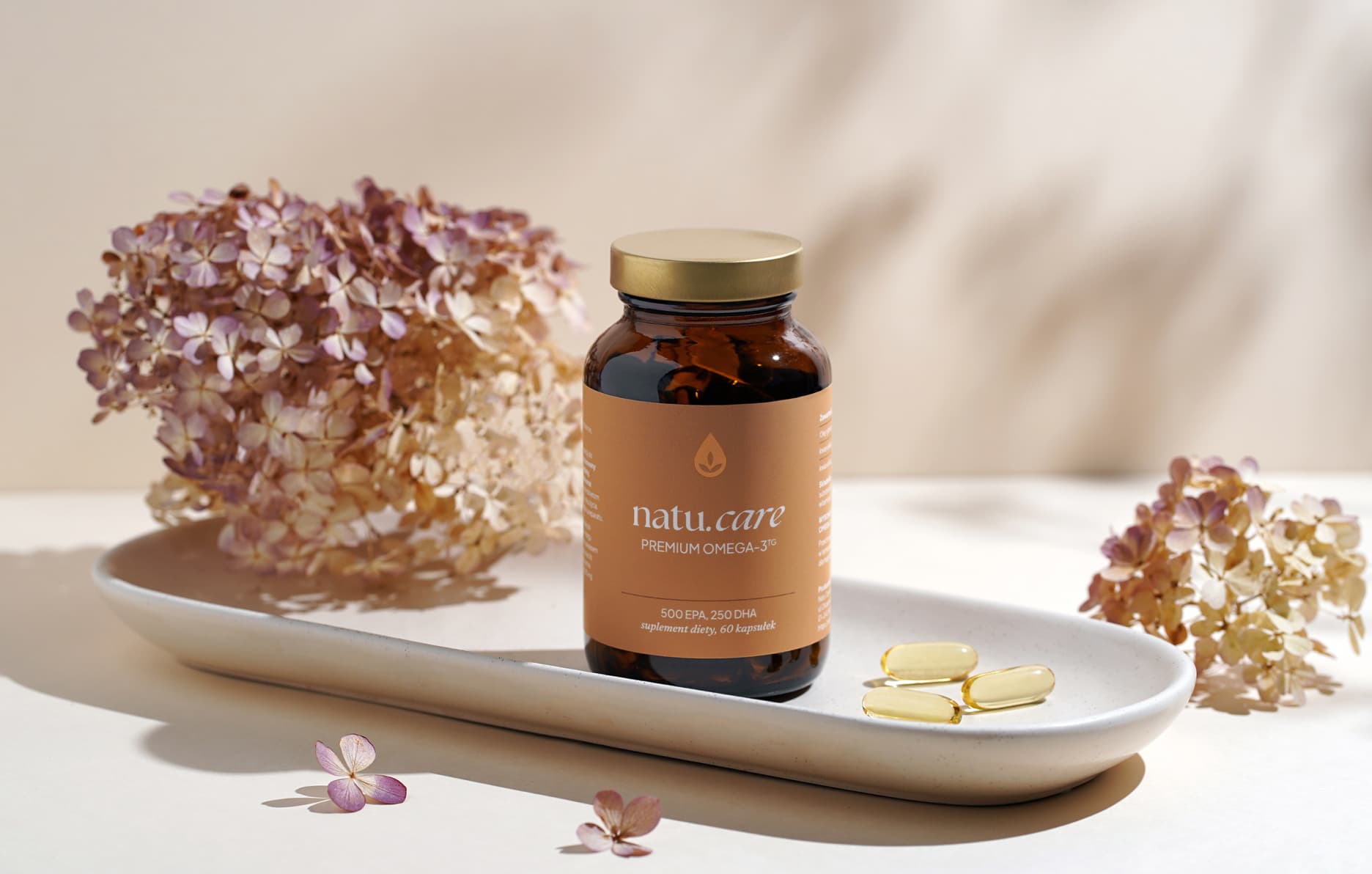
Sprawdź, za co pokochały go tysiące klientek Natu.Care Premium Omega-3ᵀᴳ -15% z kodem BLOG15
Natu.Care Omega-3ᵀᴳ Premium
Natu.Care Omega-3ᵀᴳ Premium dla zdrowia serca, mózgu i odporności. Najlepsza przyswajalność. Optymalna dawka 750 mg. Przebadana przez niezależne laboratorium.
Zobacz więcej
Produkt ma super skład, transparentną etykietę i co dla mnie jest ważne – małe kapsułki do połknięcia. Nie ma też nieprzyjemnego efektu odbijania rybą, który miałam spożywając inne produkty. Widzę znaczną poprawę odporności. Polecam!@Kasia P.
See also:
.
- What is sodium butyrate
- The best probiotics for the gut
- Good probiotics for IBS
- Best heartburn pills
- Supplements for liver regeneration
What is butyric acid?
.
Butyric acid, also known as butanoic acid, is a short chain fatty acid ( short chain fatty acids - SCFA) that plays a key role in gut health. It is produced by the bacteria that live in your digestive system.
Wondering how it works? When you eat fibre that is indigestible to your body, it passes into the large intestine. There, probiotic bacteria residing in the colon convert this fibre into butyric acid. This is a perfect example of symbiosis, where both parties benefit - the bacteria have nourishment and you get an essential substance for your healthand.
Butyric acid is extremely important for your gut. It acts as a kind of fuel for the epithelial cells lining the colon, helping them to maintain a healthy intestinal barrier. This is important because this barrier prevents harmful substances from entering your bodyand.
As early as the 1980s, studies were conducted that conclusively established butyric acid as a major source of energy for colonocytes, offering hope for its use in the prevention and treatment of gastrointestinal diseases..
 .
.
Katarzyna Grajpermagister of pharmacy
.What's more, butyric acid has anti-inflammatory properties, which may help to relieve inflammation in the gut. Some studies also suggest that it may help regulate blood sugar levels and improve metabolism. However, these are preliminary and inconclusive conclusions, so should be approached with cautionand.
So it is worth paying attention to your diet and making sure you are providing your body with enough fibre. By doing so, the probiotic bacteria will be able to produce butyric acid, which will contribute to your gut health.
Butyric acid versus sodium butyrate
.
Sodium butyrate is the sodium salt of butyric acid, or a derivative of it. The molecules of butyric acid and butyrate are chemically differentand. However, the properties of the two substances are so similar that their names are often used interchangeably.
In practice, the sodium atom in butyrate makes this butyric acid derivative more stable. It is for this reason that you will most often encounter sodium butyrate in dietary supplements.
Sodium butyrate is the most common name.
Natu.Care Collagen Premium 5000 mg, mango & passion fruit

- Collagen content: 5000 mg marine collagen hydrolysate
- Additional active ingredients: vitamin C, low molecular weight hyaluronic acid (and L-theanine and coenzyme Q10 in cocoa flavoured collagen or vitamin A and vitamin E in mango–passion fruit flavoured collagen)
- Form: powder sachets
- Dose: 1 sachet per day
- Sufficient for: 30 days
Product description
Fish collagen from the Natu.Care brand in a dose of 5000 mg, based on certified ingredients of the best quality. Regular supplementation will positively influence the appearance of the skinóry, hairów and nails – they will be rebuilt and strengthened from the inside.
In addition to collagen, which is valuable for health and beauty, it also offers other active ingredients that help to maintain a youthful complexion, shiny hair and strong nails.
The formula contains a sufficient portion of the active ingredient to positively affect joints, the musculoskeletal system and immunity.
Natu.Care Premium Collagen is available in two flavours – Cacao Bloom and Rise&Shine. Both formulas are based on the following active ingredients: marine collagen hydrolysate, wild roseóbud extract and hyaluronic acid.
Additionally, Cacao Bloom contains natural L-theanine, coenzyme Q10 and defatted Dutch cacao. Rise&Shine instead contains vitamin E and vitamin A.
These are the best collagens in the world.
These best fish collagens on the market also rós taste – Cacao Bloom is a treat for chocolate lovers. Rise&Shine will appeal to those whoólike the refreshing taste of mangoófruit and passion fruit.
Pros and cons
Pros:
- Vitamin C supports the body's collagen production, enhancing its effectiveness.
- An effective dose of hyaluronic acid, which additionally supports skin hydration and joint health.
- Fish collagen absorbs 50% better. Additionally, the manufacturer specifies the fish species it is sourced from (Atlantic cod).
- The composition has been tested by the independent and accredited J.S. Hamilton laboratory.
- MSC (Marine Stewardship Council) quality certification, which confirms that the collagen source supports sustainable fishing practices.
Cons:
- None.
Additional information
Natu.Care's fish collagen receives praise for its delicious taste. You won't find the fishy aftertaste that often comes through in other collagens. Plus, you have two tasty flavors to choose from: cocoa and mango-passionfruit.
Active ingredients like coenzyme Q10, hyaluronic acid, and natural L-theanine provide anti-inflammatory and antioxidant benefits while slowing down aging processes.
User review
Super, after about 6 weeks of use, the skin on my face became noticeably firmer. Wonderful taste.
Ania ZalewskaNatu.Care customer
Natu.Care Premium collagen 10 000 mg, mango-maracuja
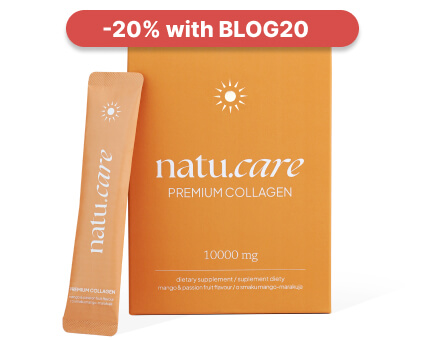
- Collagen content: 10,000 mg marine collagen hydrolysate
- Additional active ingredients: vitamin C, low molecular weight hyaluronic acid (and L-theanine and coenzyme Q10 in cocoa flavoured collagen or vitamin A and vitamin E in mango–passion fruit flavoured collagen)
- Form: powder sachets
- Dose: 1 sachet per day
- Sufficient for: 30 days
Product description
One of the strongest collagens on the market, whichós provides as much as 10,000 mg in a daily serving. This allows the formula to effectively support the condition of the skin, hair and nails.
With this supplement, you will support your beauty, which will allow you to visually stop the ageing process and feel a second youth!
Natu.Care Collagen Premium 10 000 mg comes in two flavours – cherry and mango-maracuja. Both formulas have the same product backbone – collagen, hyaluronic acid and vitamin C.
In the cherry version you additionally find glucosamine, chondroitin and Indian frankincense resin extract. Mango-maracuja, on the other hand, contains vitamin E and vitamin A.
Pros and cons
Pros:
- Tested collagen formula – SeaGarden, whose effects have been confirmed in clinical studies.
- Effective dose of hyaluronic acid, additionally moisturizing the skin and positively impacting joint health.
- Vitamin C supports the body’s natural collagen production.
- The composition has been tested by the independent and accredited J.S. Hamilton laboratory.
- The product has an MSC (Marine Stewardship Council) quality certification – the collagen source supports sustainable fishing practices.
Cons:
- None.
Additional information
Users praise Natu.Care Collagen Premium for the easy dissolvability of the powder.
User review
I noticed a significant improvement in my skin texture after a few weeks of taking collagen regularly. My complexion is now as soft as velvet!
Natu.Care Collagen Premium 10000 mg, cherry

- Collagen content: 10,000 mg of hydrolyzed bovine collagen
- Additional active ingredients: vitamin C, low molecular weight hyaluronic acid, glucosamine, chondroitin, extract of Indian frankincense resin (boswellia serrata)
- Form: powder sachets for drinking
- Serving: 1 sachet per day
- Lasts for: 30 days
Product description
One of the strongest collagens on the market, providing as much as 10,000 mg per daily serving. This product can effectively support the condition of joints, skin, hair, and nails.
With this supplement, you will support your skeletal and joint system as well as your beauty, helping you visually halt the aging process and feel rejuvenated!
Pros and cons
Pros:
- The daily portion of collagen is very large – as much as 10,000 mg.
- Proven collagen formula – COLLinstant, whose effectiveness has been confirmed in clinical studies.
- Effective dose of hyaluronic acid, which additionally moisturizes the skin and positively affects joint health.
- Vitamin C supports the body's natural collagen production.
- Glucosamine is a fundamental building block of compounds found in joint cartilage and a component of collagen that gives elasticity to connective tissue in tendons.
- Chondroitin is a natural component found in the human body, mainly in cartilage. This large molecule (mucopolysaccharide) has the ability to absorb water, which helps maintain the elasticity and resilience of cartilage.
- Frankincense resin extract supports blood circulation and joint mobility and reduces their stiffness. It may help alleviate inflammatory conditions.
- The composition has been tested by the independent and accredited J.S. Hamilton laboratory.
Cons:
- None.
Additional information
Users praise Natu.Care Collagen Premium for the easy dissolving of the powder.
Premium Sodium Butyrate
Product description
Premium Sodium Butyrate is a natural support for your digestive system. With a high dose of butyric acid (940 mg), it supports the regeneration of the intestinal mucosa, improving gut health and function, and aids in the absorption of nutrients. By taking care of your intestines, you're taking care of the health of your entire body.
Studies involving people suffering from irritable bowel syndrome confirm that sodium butyrate is ideal for supporting issues related to bacterial flora imbalances (for example, after antibiotic therapy), constipation and diarrhea, inflammation of the intestinal mucosa, or a diet low in fiber.
Premium Sodium Butyrate capsules are made using the innovative DRcaps® technology. This guarantees that the active ingredients in the product are protected from the destructive effects of stomach acids and digestive enzymes. As a result, we can be sure that the beneficial ingredients are released in the small intestine and are fully absorbed by our body.
Premium Sodium Butyrate from Natu Care is 100% tested, and its composition contains only the highest quality raw materials.
Pros and cons
Pros:
- Supports digestive system function
- Helpful for various gastrointestinal conditions, including IBS
- High dose of butyric acid in each capsule
- Eco-friendly, clean, and tested composition
- Free from added sugar, gluten, GMOs, and lactose
- Innovative capsule technology - DRcaps
Cons:
- None
Additional Information
Take 3 capsules daily at any time of the day, preferably with a meal. Swallow the capsules whole with water.
Premium Sodium Butyrate is intended for adults.
The product should be used under medical supervision.
User review
I've been using the product for 2 weeks. My stomach feels lighter, and my digestion has improved. I recommend it.
Natu.Care Premium Magnesium + Vitamin B6
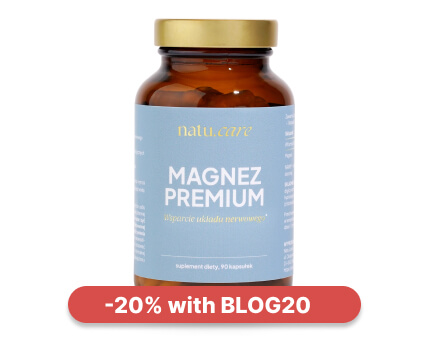
- Magnesium content per day: 305 mg
- Additional active ingredients: Vitamin B6 (2.1 mg)
- Form: capsules
- Serving size: 3 capsules per day
- Sufficient for: 30 days
Product description
The Premium Magnesium + Vitamin B6 dietary supplement is a comprehensive product that combines three organic forms of magnesium (citrate, malate, and diglycinate) and vitamin B6 in highly absorbable forms.
Magnesium is an essential mineral without which our bodies cannot function properly. It supports the immune, nervous, and muscular systems, maintains electrolyte balance, and is involved in cell division and the regulation of mental functions.
Research shows that magnesium supplementation is even more effective when accompanied by vitamin B6, which is included in our product. Vitamin B6 is responsible for the proper functioning of the nervous and immune systems, as well as the proper functioning of the heart.
If you want to safely get rid of feelings of fatigue, concentration problems, hair loss, muscle cramps, trembling, or irritability, reach for Premium Magnesium from Natu.Care, tested by the independent, certified laboratory J.S. Hamilton Poland.
Pros and cons
Pros
- Supports the proper functioning of the nervous and immune systems.
- Reduces feelings of fatigue and tiredness.
- Maintains proper psychological functions.
- The purity of the ingredients (free from anti-caking agents, artificial fillers, and additives such as titanium dioxide, microcrystalline cellulose, talc, magnesium stearate, and silicon dioxide) has been confirmed by laboratory tests.
- High absorption of ingredients.
- Soft capsules that are easy to swallow.
- Suitable for vegetarians and vegans.
Cons
- None.
Additional information
Take with a meal, 3 capsules per day.
The capsules should be taken with at least 250 ml of water.
If you have trouble sleeping, it is advisable to take 1 capsule in the morning and 2 capsules in the evening, no later than 4 hours before bedtime.
Avoid combining with products high in calcium (milk, yogurt, cheese), as this may negatively affect magnesium absorption.
Pregnant and breastfeeding women should consult a doctor before starting supplementation.
User review
I’m very impressed with the speed of delivery. The product itself is of high quality and absorbs well. After two weeks of supplementation, I’ve noticed a significant improvement in muscle recovery, especially during periods of intense training. I highly recommend it!
Product description
The dietary supplement contains omega-3ᵀᴳ, or omega-3 acids in the form of trójglyceridesów. Scientific studies suggest that this form of fatty acidsós up to 2 times better absorbed than the estersós present in many dietary supplements on the market. This means that you are assured of their effectiveness and of supplying yourself with valuable omega acids.
Fatty acids omega-3 are derived from wild anchovy oil. It is a rich source of healthy fats that are essential for the health of the cardiovascular, immune and nervous systems, as well as the proper function of vision, joints muscles.
Scientific research suggests that wild anchovies are a good source of healthy fats.
Scientific research also suggests that an adequate intake of omega-3 fatty acidsós protects against and supports the treatment of depression and anxiety disorders. In addition, omega-3s influence the hydration and appearance of the skinóry and support healthy sleep.
.
The formula contains a total of 750 mg of EPA+DHA acidsós, which is three times higher than the recommended minimum of 250 mg for the Polish population. Omega-3 TG Premium has studies indicating that its TOTOX is 9, which is a very good result.
Supplementation of omega-3 fatty acidsóis recommended for anyone who does not eat 1–2 portions (approximately 300 g) of oily fish per week. Children during growth, seniors, physically active people, vegans and vegetarians, as well as patients undergoing cardiovascular treatment and prevention of heart disease also have an increased need.
Pros and cons
The dietary supplement contains omega-3ᵀᴳ, or omega-3 acids in the form of trójglyceridesów. Scientific studies suggest that this form of fatty acidsós up to 2 times better absorbed than the estersós present in many dietary supplements on the market. This means that you are assured of their effectiveness and of supplying yourself with valuable omega acids.
Fatty acids omega-3 are derived from wild anchovy oil. It is a rich source of healthy fats that are essential for the health of the cardiovascular, immune and nervous systems, as well as the proper function of vision, joints muscles.
Scientific research suggests that wild anchovies are a good source of healthy fats.
Scientific research also suggests that an adequate intake of omega-3 fatty acidsós protects against and supports the treatment of depression and anxiety disorders. In addition, omega-3s influence the hydration and appearance of the skinóry and support healthy sleep.
.
The formula contains a total of 750 mg of EPA+DHA acidsós, which is three times higher than the recommended minimum of 250 mg for the Polish population. Omega-3 TG Premium has studies indicating that its TOTOX is 9, which is a very good result.
Supplementation of omega-3 fatty acidsóis recommended for anyone who does not eat 1–2 portions (approximately 300 g) of oily fish per week. Children during growth, seniors, physically active people, vegans and vegetarians, as well as patients undergoing cardiovascular treatment and prevention of heart disease also have an increased need.
Additional information
The dietary supplement contains omega-3ᵀᴳ, or omega-3 acids in the form of trójglyceridesów. Scientific studies suggest that this form of fatty acidsós up to 2 times better absorbed than the estersós present in many dietary supplements on the market. This means that you are assured of their effectiveness and of supplying yourself with valuable omega acids.
Fatty acids omega-3 are derived from wild anchovy oil. It is a rich source of healthy fats that are essential for the health of the cardiovascular, immune and nervous systems, as well as the proper function of vision, joints muscles.
Scientific research suggests that wild anchovies are a good source of healthy fats.
Scientific research also suggests that an adequate intake of omega-3 fatty acidsós protects against and supports the treatment of depression and anxiety disorders. In addition, omega-3s influence the hydration and appearance of the skinóry and support healthy sleep.
.
The formula contains a total of 750 mg of EPA+DHA acidsós, which is three times higher than the recommended minimum of 250 mg for the Polish population. Omega-3 TG Premium has studies indicating that its TOTOX is 9, which is a very good result.
Supplementation of omega-3 fatty acidsóis recommended for anyone who does not eat 1–2 portions (approximately 300 g) of oily fish per week. Children during growth, seniors, physically active people, vegans and vegetarians, as well as patients undergoing cardiovascular treatment and prevention of heart disease also have an increased need.
Expert opinion
The dietary supplement contains omega-3ᵀᴳ, or omega-3 acids in the form of trójglyceridesów. Scientific studies suggest that this form of fatty acidsós up to 2 times better absorbed than the estersós present in many dietary supplements on the market. This means that you are assured of their effectiveness and of supplying yourself with valuable omega acids.
Fatty acids omega-3 are derived from wild anchovy oil. It is a rich source of healthy fats that are essential for the health of the cardiovascular, immune and nervous systems, as well as the proper function of vision, joints muscles.
Scientific research suggests that wild anchovies are a good source of healthy fats.
Scientific research also suggests that an adequate intake of omega-3 fatty acidsós protects against and supports the treatment of depression and anxiety disorders. In addition, omega-3s influence the hydration and appearance of the skinóry and support healthy sleep.
.
The formula contains a total of 750 mg of EPA+DHA acidsós, which is three times higher than the recommended minimum of 250 mg for the Polish population. Omega-3 TG Premium has studies indicating that its TOTOX is 9, which is a very good result.
Supplementation of omega-3 fatty acidsóis recommended for anyone who does not eat 1–2 portions (approximately 300 g) of oily fish per week. Children during growth, seniors, physically active people, vegans and vegetarians, as well as patients undergoing cardiovascular treatment and prevention of heart disease also have an increased need.
Natu.Care Vitamin D 2000 UI
Product description
Vitamin D plays a crucial role in our health and well-being. It affects calcium and phosphate metabolism, which translates to healthy bones and teeth. It also helps regulate the immune system, and studies indicate its influence on the functioning of the nervous system.
Vitamin D, although called a “vitamin,” is actually a prohormone that our body produces on its own, primarily under the influence of sunlight. Unfortunately, our modern lifestyle contributes to deficiencies of this essential vitamin. Working in enclosed office buildings, using (necessary!) SPF creams, and covering the body with clothing all make it very difficult, if not impossible, to obtain adequate levels of vitamin D from sunlight. This is why appropriate, year-round supplementation is so crucial.
Vitamin D from Natu.Care is a well-tested vitamin D3 suspended in safflower oil, a plant known for its numerous health benefits. The convenient, easy-to-swallow capsule will make supplementation a part of your daily, healthy routine, improving your overall well-being.
Pros and cons
Pros:
- Ensures proper functioning of the immune system
- Supports the maintenance of healthy bones and teeth
- Maintains proper heart, kidney, and muscle function
- Tested by an independent, certified laboratory
- Convenient and easy-to-swallow capsule
- Clean composition - free from added sugar, gluten, GMOs, lactose, and without preservatives or colorants
Cons:
- None.
Additional Information
Pregnant women and breastfeeding mothers should consult a doctor before using the product. This dietary supplement is intended for a healthy adult population up to the age of 75.
Collagen Booster - Glow Stories
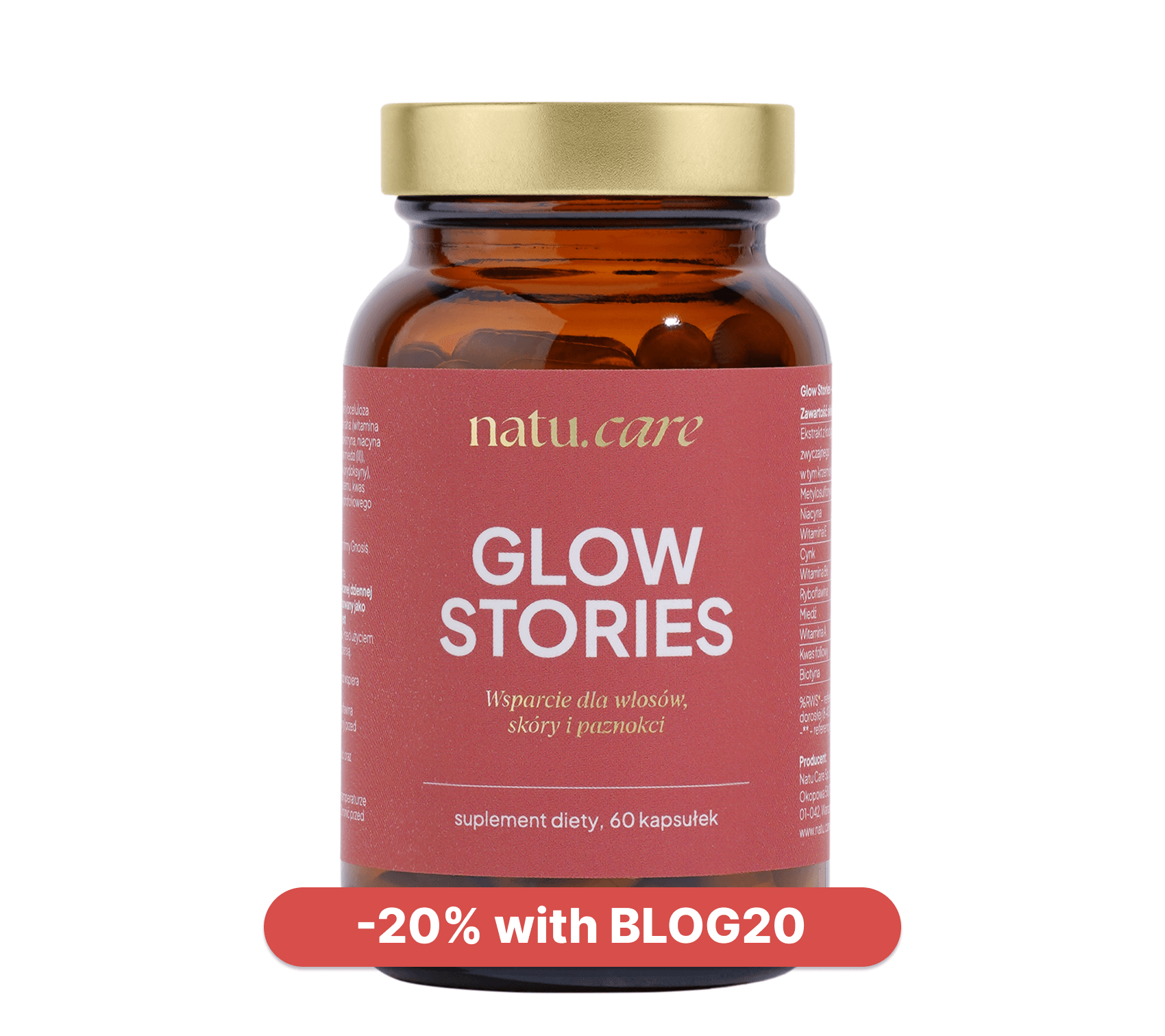
- Active ingredients: bamboo shoot extract, Quatrefolic®, L-Methionine, L-cysteine, vitamin E, vitamin A, niacin (vitamin B3), vitamin B6, vitamin B2 (riboflavin), biotin, zinc, copper
- .
- Form: capsules
- .
- Dose: 1 capsule per day
- .
- Sufficient for: 60 days
- .
Product description
A dietary supplement containing vitamins, minerals and plant extracts thatósupport the skinóhand, hair and nails. The product is especially distinguished by the form of folate – it is Quatrefolic, whichós absorbed very well and is natural.
In addition to valuable vitamins and minerals, such as vitamin A, E, B3, B2 and biotin, the formula contains bamboo shoot extract, whichóry further enhances your beauty.
Pros and cons
A dietary supplement containing vitamins, minerals and plant extracts thatósupport the skinóhand, hair and nails. The product is especially distinguished by the form of folate – it is Quatrefolic, whichós absorbed very well and is natural.
In addition to valuable vitamins and minerals, such as vitamin A, E, B3, B2 and biotin, the formula contains bamboo shoot extract, whichóry further enhances your beauty.
Additional information
A dietary supplement containing vitamins, minerals and plant extracts thatósupport the skinóhand, hair and nails. The product is especially distinguished by the form of folate – it is Quatrefolic, whichós absorbed very well and is natural.
In addition to valuable vitamins and minerals, such as vitamin A, E, B3, B2 and biotin, the formula contains bamboo shoot extract, whichóry further enhances your beauty.
Properties of butyric acid
.
Butyric acid is a key ingredient for the proper functioning of the epithelial cells of the colon, called colonocytes. It provides up to 70% of the energy these cells need to functionand.
This, however, is not the only function that butyric acid has in our bodies. It is currently the subject of scientific research to understand its potential effects on the immune system and its ability to reduce inflammation. In addition, its properties affecting insulin regulationand are also being studied.
Although the exact mechanism of action of butyric acid at the biochemical level is not yet fully understood, there is some evidence to suggest that it may affect various aspects of bodily function. This may includeand:
- impact on the immune response, .
- cell differentiation, .
- natural process of elimination of defective and damaged cells, .
Butyric acid may also help to strengthen the protective barrier in the intestines by participating in the production of the mucus that lining themand.
Applications of butyric acid
.
Butyric acid is a well-known ally in the fight against various digestive problems. First and foremost, this metabolite plays a key role in protecting and regenerating the end sections of the digestive systemand.
It is also an effective solution if you are struggling with problems such as bloating or constipation. Butyric acid aids intestinal peristalsis, which in practice means that it facilitates the bowel movement process.
The usefulness of butyric acid in infectious diarrhoea has also been clinically confirmed. This is related, among other things, to the mechanism of regulation of water and electrolyte absorption in the cell membrane of colonocytes..
 .
.
Katarzyna Grajpermagister of pharmacy
.What's more, butyric acid helps to control gas accumulation in the intestines. As a result, you are able to reduce the unpleasant bloating that can cause discomfortand.
It is also worth adding that some studies suggest additional benefits for your body. Some scientific work has shown that butyric acid may contribute to maintaining a healthy body weight, by regulating metabolic processes related to insulin and lipid production .
Do not, however, consider butyric acid (or its derivative, sodium butyrate) as a weight-loss agent. There is still a dispute among scientists about how butyric acid affects our metabolism.
Most studies are in vitro experiments or those involving animals. There are also researchers who point in their work to links between high concentrations of butyrate or butyric acid and metabolic disorders and cardiovascular disease - as you can see, in this case, what's too much is unhealthyand.
Butyric acid for the gut
.
Butyric acid has many important functions in your intestines. Not only is it a source of energy for the cells of the colon, but it also supports their regeneration. In addition, it supports the production of mucus, which is an important part of the protective intestinal barrierand.
Thanks to this, butyric acid helps to protect your body from harmful substances and pathogens that could enter the bloodstream through this route.
Animal studies suggest that butyric acid may provide relief from irritable bowel syndrome (IBS) symptoms, such as abdominal pain or irregular bowel movementsand.
A 2022 study review indicates that butyric acid derivatives may be helpful in the treatment of colorectal cancer. The results suggest that the ingredient may induce cancer cell death, improve the efficacy of radiotherapy and protect mucosa from degradation that can occur during chemotherapyand.
Butyric acid provides energy to healthy cells and at the same time may inhibit the growth of cancerous ones, a phenomenon known as the Warburg effect. Therefore, there is a hypothesis that certain strains probiotics may exhibit anti-cancer effectsand.
Butyric acid is also used by intestinal cells to produce energy, which increases oxygen consumption by the epithelium. As a result, the presence of butyric acid-producing bacteria helps to maintain an anaerobic environment in the intestines, which further protects against the colonisation of aerobic pathogens such as Salmonella or bacteria E. coli.
.
What is butyric acid found in?
.
Butyric acid is not only found in your intestines. Some foods - especially milk and milk products (dairy products), for example butter, cream, yoghurt or hard yellow cheeses - also contain small amounts of it. Support for butyric acid synthesis can also be provided by products rich in probiotics and prebiotics.
By increasing the amount of probiotics in your gut, you increase the amount producers of butyric acid. And by eating prebiotic foods, you provide them with the necessary materials for this production.
.
|
Products rich in probiotics . |
Products rich in prebiotics (GOS and FOS fibre)* . |
|
|
* GOS and FOS fibre are oligosaccharides, or complex carbohydrates (fructooligosaccharides and galactooligosaccharides), which do not digest in the stomach but are only fermented in the large intestine - providing food for probiotic bacteria and contributing to butyric acid production.
Best results will be achieved by using different fibre fractions from three different groups including cereals, vegetables and fruit. Also ensure adequate hydration..
 .
.
Katarzyna Grajpermagister of pharmacy
..
Butyric acid sweetness
.
Butyric acid is considered safe, but there are situations in which its use must be abandoned.
Do not take butyric acid or its derivatives (butyrate) ifand:
- .
- you are allergic to butyric acid or any other ingredient in the supplement, .
- you have kidney problems, as butyric acid is removed from the body specifically by the kidneys, .
- you suffer from heart disease, as butyric acid can affect sodium levels in the body, which can be dangerous, .
- you should limit fibre in your diet because of certain digestive ailments, .
- you are pregnant or breastfeeding - the safety of using butyric acid during these periods is not well studied, .
- you are taking any medication - in which case consult your doctor before starting supplementation, as butyric acid may interact with some substances.
Despite its benefits, butyric acid can cause some side effects, although this is rather rare. The most common are gastrointestinal problems such as increased bowel function, nausea, abdominal pain and diarrhoea, and changes in appetiteand.
.
Often these symptoms disappear after a few days, but if they are bothersome or worsen, you should stop supplementation and consult your doctor.
The effects of allergic reactions are a different matter. Their symptoms areand:
- rash, .
- catarrh, .
- swelling, .
- difficulty breathing, .
If this occurs, discontinue use of the butyric acid preparation immediately and contact your doctor.
See also:
.

Sprawdź, za co pokochały go tysiące klientek Natu.Care Premium Omega-3ᵀᴳ -15% z kodem BLOG15
Natu.Care Omega-3ᵀᴳ Premium
Natu.Care Omega-3ᵀᴳ Premium dla zdrowia serca, mózgu i odporności. Najlepsza przyswajalność. Optymalna dawka 750 mg. Przebadana przez niezależne laboratorium.
Zobacz więcej
Produkt ma super skład, transparentną etykietę i co dla mnie jest ważne – małe kapsułki do połknięcia. Nie ma też nieprzyjemnego efektu odbijania rybą, który miałam spożywając inne produkty. Widzę znaczną poprawę odporności. Polecam!@Kasia P.
Summary
.
- Butyric acid is a metabolite of the fermentation of fibre by probiotic bacteria that inhabit the large intestine.
- Butyric acid is the main source of energy for colon epithelial cells. It also has protective and regenerative functions.
- Butyric acid can promote intestinal peristalsis and support the production of mucus, which is part of the natural intestinal barrier.
- The effects of butyric acid and its derivative, butyrate, in the context of influencing insulin and lipid metabolism and combating inflammation in the body are currently being investigated.
- Butyrate is an important component of the intestinal barrier.
- The appropriate concentration of butyric acid in the body is best ensured by consuming foods rich in GOS and FOS fibre, as well as probiotics.
- Butyric acid can also be taken in dietary supplements. It is most commonly found in these in the form of sodium butyrate.
- Butyrate supplements are also a good way to take it.
- Supplements with butyrate or butyric acid should be avoided by people with heart disease and ailments that require restricted fibre intake.
FAQ
.How to make butyric acid at home
.Note: butyric acid is a really smelly thing. Think twice about whether you want to make it at home (if you live in a block of flats, think about your neighbours too). Another important thing: Do not eat butyric acid obtained this way!
To make butyric acid, all you need to do is leave the butter out of the fridge - until it goes rancid. But to be able to isolate it, you can use this recipe:
- Melt 500ml of butter in a pot over a low heat; .
- Add 500 ml distilled water, stir to combine. .
- Pour the mixture into a jar and add 2 tablespoons of natural yogurt as a starter. .
- Cover the jar and keep in a warm place for 2-3 days. .
- After this time, strain the liquid through a thick sieve, separating the solids. .
- Heat the remaining liquid to 100°C until the water evaporates. .
- The residue that remains is butyric acid. .
Where does butyric acid occur?
.Butyric acid occurs naturally in many products, especially butter. You will also find it in other dairy products such as cheese, cream and yoghurt. Furthermore, it is also contained in ghee, a type of clarified butter.
Butyric acid is also produced in the human body - in the gut, as a result of the fermentation of fibre by bacteria. For this reason, eat fibre-rich foods such as fruit, vegetables, nuts, seeds and whole-grain cereal products. This is important because butyric acid has many health benefits. It has anti-inflammatory effects and supports gut health.
What are the side effects of taking butyric acid?
.Taking butyric acid can lead to several side effects. The most common are abdominal pain, bloating, diarrhoea and nausea. For these symptoms, reduce the dose of butyric acid or divide it into several smaller portions throughout the day. This may help to minimise discomfort. Sometimes an allergic reaction may also occur.
What is the smell of butyric acid?
.Butyric acid has an intense, unpleasant odour that is often compared to the smell of... vomit. This is due to the specific chemical structure of this acid, which contains four carbon atoms in its chain. However, in small quantities, it can contribute to the characteristic taste of some foods (especially cheese).
What is the formula of butyric acid?
.The chemical formula of butyric acid is C4H8O2. It is a carboxylic acid that consists of four carbon atoms (C), eight hydrogen atoms (H) and two oxygen atoms (O). Carbon (C) comes first, followed by hydrogen (H) and finally oxygen (O).
This order is important because it indicates the structure of the molecule. Other chemical formulas of butyric acid that you may encounter are C3H7COOH and CH3(CH2)2COOH.
How much does butyric acid cost?
.Dietary supplements containing butyric acid, or more commonly its derivative - sodium butyrate - cost from around £30 to £150. Differences in price may be due to the quality of the raw material itself, the size of the packaging and the additional active ingredients used in the formulation.
Is butyric acid in medicinal form?
.Butyric acid (also in the form of sodium butyrate) is only available in Poland as a dietary supplement. You can find it in health food shops or pharmacies. Only buy products from trusted manufacturers to ensure the best quality and safety.
Butyric acid is important for intestinal health, as it is the main source of energy for intestinal epithelial cells. An example of a product containing butyric acid in the form of sodium butyrate is Panaseus Formula for the Gut.
.
Resources
.See all
.: Immune Network :: (n.d.). Retrieved November 3, 2023, from https://immunenetwork.org/DOIx.php?id=10.4110/in.2020.20.e15
Amiri, P., Hosseini, S. A., Roshanravan, N., Saghafi-Asl, M., & Tootoonchian, M. (2023). The effects of sodium butyrate supplementation on the expression levels of PGC-1α, PPARα, and UCP-1 genes, serum level of GLP-1, metabolic parameters, and anthropometric indices in obese individuals on weight loss diets: A study protocol for a triple-blind, randomized, placebo-controlled clinical trial. Trials, 24(1), 489. https://doi.org/10.1186/s13063-022-06891-9
Banasiewicz, T., Domagalska, D., Borycka-Kiciak, K., & Rydzewska, G. (2020). Determination of butyric acid dosage based on clinical and experimental studies - a literature review. Gastroenterology Review/Review of Gastroenterology, 15(2), 119-125. https://doi.org/10.5114/pg.2020.95556
Birt, D. F., Boylston, T., Hendrich, S., Jane, J.-L., Hollis, J., Li, L., McClelland, J., Moore, S., Phillips, G. J., Rowling, M., Schalinske, K., Scott, M. P., & Whitley, E. M. (2013). Resistant Starch: Promise for Improving Human Health. Advances in Nutrition, 4(6), 587-601. https://doi.org/10.3945/an.113.004325
Borycka-Kiciak, K., Banasiewicz, T., & Rydzewska, G. (2017). Butyric acid - a well-known molecule revisited. Gastroenterology Review/Review of Gastroenterology, 12(2), 83-89. https://doi.org/10.5114/pg.2017.68342
Butyric Acid-An overview | ScienceDirect Topics. (n.d.). Retrieved November 10, 2023, from https://www.sciencedirect.com/topics/medicine-and-dentistry/butyric-acid
Candido, E. P. M., Reeves, R., & Davie, J. R. (1978). Sodium butyrate inhibits histone deacetylation in cultured cells. Cell, 14(1), 105-113. https://doi.org/10.1016/0092-8674(78)90305-7
De la Cuesta-Zuluaga, J., Mueller, N. T., Álvarez-Quintero, R., Velásquez-Mejía, E. P., Sierra, J. A., Corrales-Agudelo, V., Carmona, J. A., Abad, J. M., & Escobar, J. S. (2019). Higher Fecal Short-Chain Fatty Acid Levels Are Associated with Gut Microbiome Dysbiosis, Obesity, Hypertension and Cardiometabolic Disease Risk Factors. Nutrients, 11(1), Article 1. https://doi.org/10.3390/nu11010051
Effects of oral butyrate supplementation on inflammatory potential of circulating peripheral blood mononuclear cells in healthy and obese males | Scientific Reports. (n.d.). Retrieved November 3, 2023, from https://www.nature.com/articles/s41598-018-37246-7
Frontiers | Protective role of butyrate in obesity and diabetes: New insights. (n.d.). Retrieved November 5, 2023, from https://www.frontiersin.org/articles/10.3389/fnut.2022.1067647/full
Kaźmierczak-Siedlecka, K., Marano, L., Merola, E., Roviello, F., & Połom, K. (2022). Sodium butyrate in both prevention and supportive treatment of colorectal cancer. Frontiers in Cellular and Infection Microbiology, 12. https://www.frontiersin.org/articles/10.3389/fcimb.2022.1023806
Lewandowski, K., Kaniewska, M., Karlowicz, K., Rosolowski, M., & Rydzewska, G. (2022). The effectiveness of microencapsulated sodium butyrate at reducing symptoms in patients with irritable bowel syndrome. Gastroenterology Review/Review of Gastroenterology, 17(1), 28-34. https://doi.org/10.5114/pg.2021.112681
Liu, H., Wang, J., He, T., Becker, S., Zhang, G., Li, D., & Ma, X. (2018). Butyrate: A Double-Edged Sword for Health? Advances in Nutrition, 9(1), 21-29. https://doi.org/10.1093/advances/nmx009
Sodium butyrate in the treatment of functional and inflammatory bowel disease | Practical Gastroenterology-Practitioner's Journal. (n.d.). Retrieved November 3, 2023, from https://gastroenterologia-praktyczna.pl/a4708/Maslan-sodu-w-leczeniu-chorob-czynnosciowych-i-zapalnych-jelit.html/
Miller, A. A., Kurschel, E., Osieka, R., & Schmidt, C. G. (1987). Clinical pharmacology of sodium butyrate in patients with acute leukemia. European Journal of Cancer and Clinical Oncology, 23(9), 1283-1287. https://doi.org/10.1016/0277-5379(87)90109-X
Pietrzak, A., Banasiuk, M., Szczepanik, M., Borys-Iwanicka, A., Pytrus, T., Walkowiak, J., & Banaszkiewicz, A. (2022). Sodium Butyrate Effectiveness in Children and Adolescents with Newly Diagnosed Inflammatory Bowel Diseases-Randomized Placebo-Controlled Multicenter Trial. Nutrients, 14(16), Article 16. https://doi.org/10.3390/nu14163283
Säemann, M. D., Böhmig, G. A., Österreicher, C. H., Burtscher, H., Parolini, O., Diakos, C., Stöckl, J., Hörl, W. H., & Zlabinger, G. J. (2000). Anti-inflammatory effects of sodium butyrate on human monocytes: Potent inhibition of IL-12 and up-regulation of IL-10 production. The FASEB Journal, 14(15), 2380-2382. https://doi.org/10.1096/fj.00-0359fje
Segain, J.-P., Blétière, D. R. de la, Bourreille, A., Leray, V., Gervois, N., Rosales, C., Ferrier, L., Bonnet, C., Blottière, H. M., & Galmiche, J.-P. (2000). Butyrate inhibits inflammatory responses through NFκB inhibition: Implications for Crohn's disease. Gut, 47(3), 397-403. https://doi.org/10.1136/gut.47.3.397
Sodium butyrate. (n.d.). American Chemical Society. Retrieved November 3, 2023, from https://www.acs.org/molecule-of-the-week/archive/s/sodium-butyrate.html
Spina, L., Cavallaro, F., Fardowza, N. I., Lagoussis, P., Bona, D., Ciscato, C., Rigante, A., & Vecchi, M. (2007). Butyric acid: Pharmacological aspects and routes of administration. Digestive and Liver Disease Supplements, 1(1), 7-11. https://doi.org/10.1016/S1594-5804(08)60004-2
.Summer, A., Formaggioni, P., Franceschi, P., Di Frangia, F., Righi, F., & Malacarne, M. (2017). Cheese as Functional Food: The Example of Parmigiano Reggiano and Grana Padano. Food Technology and Biotechnology, 55(3), 277-289. https://doi.org/10.17113/ftb.55.03.17.5233
Xu, Y.-H., Gao, C.-L., Guo, H.-L., Zhang, W.-Q., Huang, W., Tang, S.-S., Gan, W.-J., Xu, Y., Zhou, H., & Zhu, Q. (2018). Sodium butyrate supplementation ameliorates diabetic inflammation in db/db mice. Journal of Endocrinology, 238(3), 231-244. https://doi.org/10.1530/JOE-18-0137
Zou, X., Ji, J., Qu, H., Wang, J., Shu, D. M., Wang, Y., Liu, T. F., Li, Y., & Luo, C. L. (2019). Effects of sodium butyrate on intestinal health and gut microbiota composition during intestinal inflammation progression in broilers. Poultry Science, 98(10), 4449-4456. https://doi.org/10.3382/ps/pez279
.
Editorials
Meet the team

master of pharmacy
Katarzyna Grajper is a graduate in pharmacy from the Medical University of Gdansk. She works as a Master of Pharmacy in a pharmacy on a daily basis. She tries to constantly expand her knowledge with current guidelines so that the patient can receive competent advice in accordance with EBM (Evidence Based Medicine).

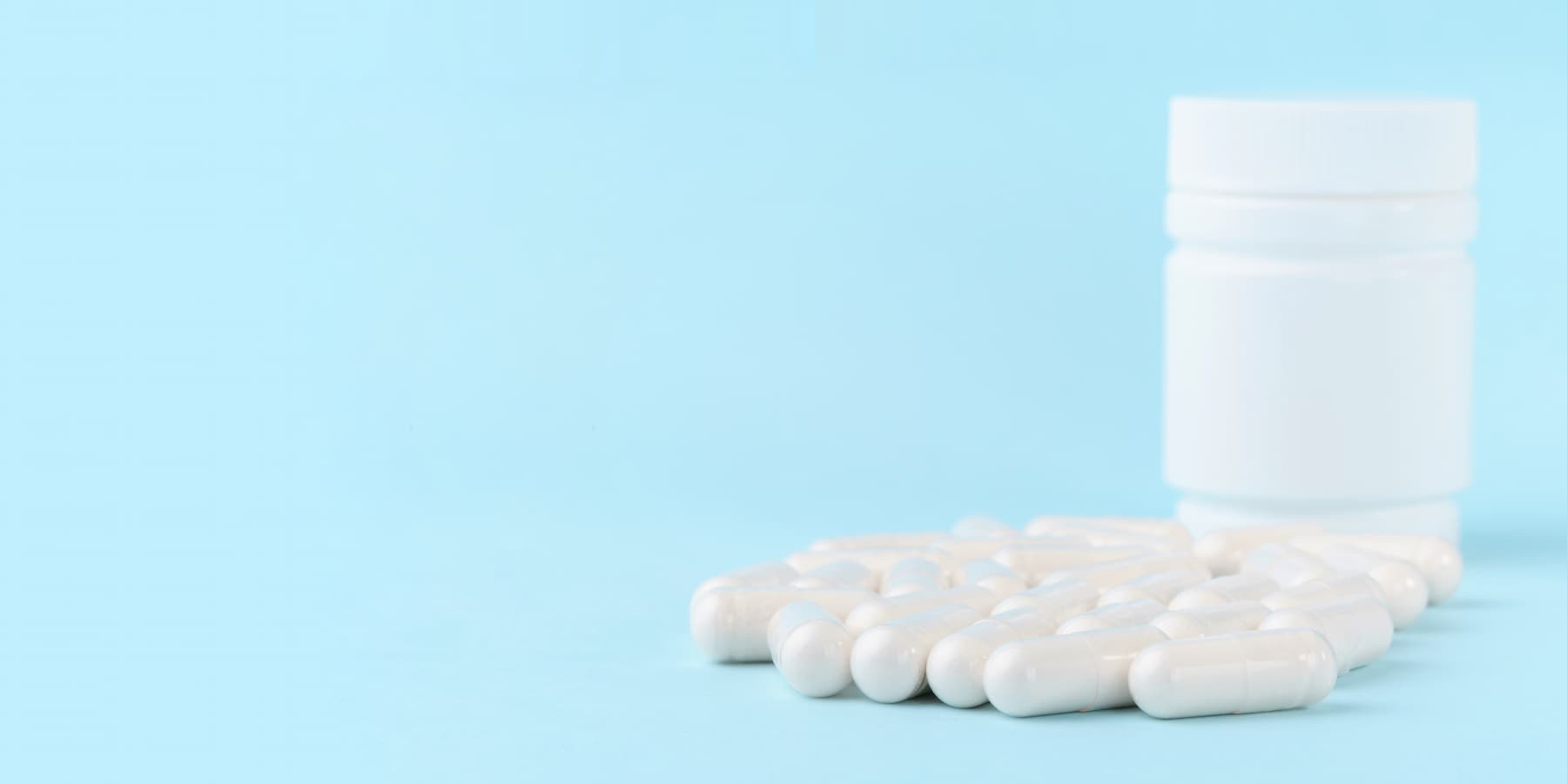
Chondroitin helps the joints and other elements of the body.

Glutathione is one of the most potent antioxidants for supporting the body's health. Find out how it works and where to get it from.

See why hip joints hurt and how to treat their ailments.
